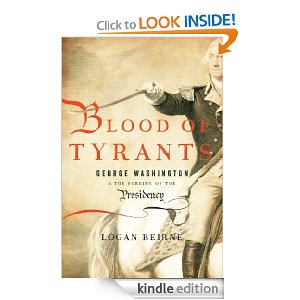 Logan Beirne, Olin Scholar at Yale Law School, is the highly talented author of Blood of Tyrants: George Washington & the Forging of the Presidency.
Logan Beirne, Olin Scholar at Yale Law School, is the highly talented author of Blood of Tyrants: George Washington & the Forging of the Presidency.
This myth-defying book, published by Encounter Books in April 2013, answers the timely question: “What would George Washington do if he were here today?”—based on what he and fellow founders actually did 225 years ago! Blood of Tyrants provides groundbreaking details on how our first Commander in Chief dealt with the issues still facing us in the present: from military tribunals, torture, and enemy combatants to political partisanship, Congressional meddling, government debt crisis, and let’s not forget, sex scandals.
Drawing directly from the papers of George Washington and his contemporaries, Beirne created a living history that dispels common mis-perceptions about our founding fathers and tells us how they would handle our present crises and forge America’s future.
The book is brilliantly informative and chock-full of surprises. Prepare to be shocked, amazed and educated!
Who should read this book? Anyone interested in modern politics or history or simply looking for some fun. The history in the book has serious implications for today’s politics, but the wild stories Beirne found are worth the read on their own. He said he wanted to write something that would both entertain and teach, whether you are reading it at the beach or your study.
Below is a brief Q&A with Logan on significant topics from the book that apply to today’s world:
IMPACT ON THE PRESENT: How does history impact the present?
Many judges, politicians, and academics believe that the Founders’ intent governs what our Constitution means today. So when our founding fathers created the Presidency based on George Washington’s precedents, that history directly impacts President Obama’s powers.
DEBT CRISIS: Do the Founders have any advice for our current debt crisis?
The country was nearly bankrupted by a debt crisis after the Revolution. Washington and our Founders made debt repayment their top priority, both raising taxes and watching spending while staying out of costly battles overseas.
Madison said “Public Debt is a Public curse” and Washington advised in his farewell address, “[A]void[] … the accumulation of debt, not only by shunning occasions of expense, but by vigorous exertions in time of peace to discharge the debts, . . . not ungenerously throwing upon posterity the burthen, which we ourselves ought to bear.”
NOTHING NEW UNDER THE SUN: Times were different then – is it fair to compare us to the Founders?
We tend to place the Founders on a pedestal and forget that they were real men grappling with some of the same issues we face today. People are people and when you hear about how Washington’s second in command was caught sleeping with a “dirty hussy” in Martha’s sitting room, you will see how little has changed.
SCANDALS: Were there other scandals back then?
Plenty, the British generals were all sleeping with their officers’ wives instead of paying attention to the war – it is part of the reason we won. Even Washington was accused of nightly visits to a Jersey girl named Mary, but that was likely just a smear campaign.
TERRORISTS: How would George Washington have handled Khalid Sheikh Mohammed, the Mastermind of 9/11 who remains in custody after years of legal wrangling?
Washington would have thrown KSM before a military commission and executed him days after we caught him in 2003. He would find the debates over civilian vs. military tribunals ridiculous – to him, it is the Commander in Chief’s duty to defend Americans’ rights, not foreign enemies’. Let’s just say that Bin Laden’s son-in-law likewise would be in the ground right now instead of a courtroom in New York.
FOREIGN POLICY: Would our Founders have any advice for us regarding foreign policy?
Yes, the Founders were wary of foreign entanglements and were only willing to get involved if it directly benefited the United States. Rather than be the policemen of the world, they acted as an example for it, only engaging when our people were directly under attack or it was in our immediate economic interests.
DRONE ATTACKS: Would the Founders find the drone attacks legal?
Yes and no, they would cheer on our efforts to kill foreign enemy combatants. However, in the case of attacks on American citizens suspected of breaking the law, they would be appalled.
DISPELLING MYTHS: Could Washington tell a lie?
Despite the myth of the cherry tree, Washington was a master of deception. In fact, it was pivotal in fooling our enemies and paving the way for the underdog Americans to defeat the mightiest empire on earth.
ENTERTAINING TRIVIA: Were Washington’s teeth made of wood?
No, his dentures were made from hippopotamus ivory and human teeth.
PARTISANSHIP: What would the Founders think of today’s partisanship?
Washington despised political parties and is probably rolling in his grave. But despite his best efforts, parties were inevitable with Jefferson and Madison founding the Democratic Republicans to oppose Hamilton’s Federalists before the ink on the Constitution even dried. They would look at today’s deadlock with surprise and probably blame us voters for being stupid enough to keep electing these people.
TORTURE: Would Washington resort to torture?
Washington was morally opposed to mistreating prisoners. But he was even more opposed to letting Americans die. He was a practical man and if he could use British captives to save American lives, he would.
NSA: At our nation’s founding, we sought to guard against permeating secret government surveillance lacking in oversight and accountability. They would condemn Congress’ abdication of its responsibility to monitor such activities on behalf of the American people. Benjamin Franklin warned, “Those who would give up Essential Liberty, to purchase a little Temporary safety, deserve neither Liberty nor Safety.”



